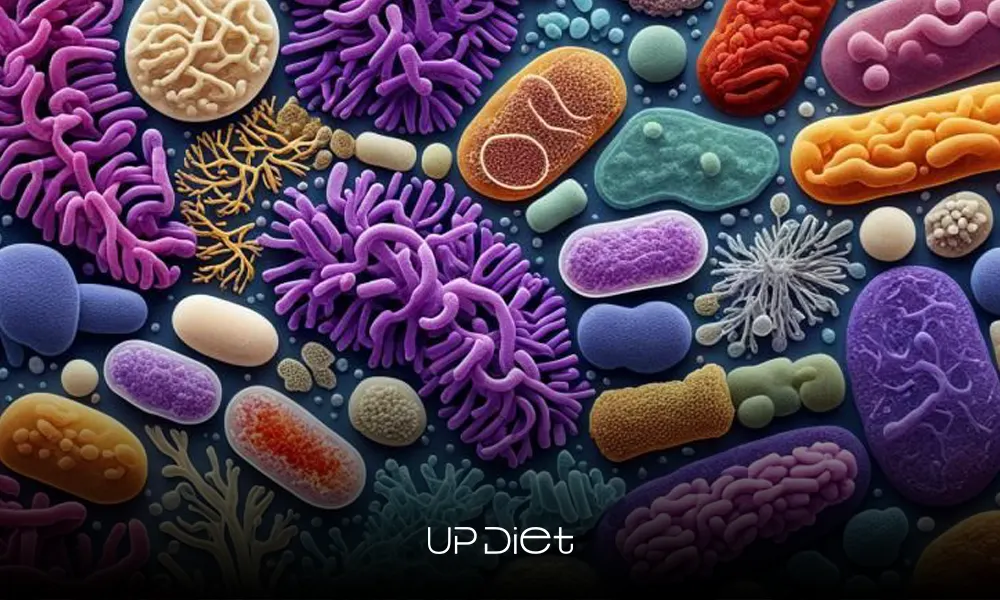Get a plan made for your unique body and goals
What Do Bacteria Do in a Healthy Gut Microbiome?

If you’ve ever wondered “what do bacteria do in a healthy gut microbiome?”, the answer is: everything. Without them, your body wouldn’t be able to effectively digest food, regulate energy levels, or even defend itself against diseases.
Let’s see what kind of microorganisms live in your gut, what their functions are, and how you can strengthen them naturally.
Understanding the Gut Microbiome
The gut microbiome is a vast, dynamic ecosystem of roughly 100 trillion microorganisms that live in your digestive tract.

This living community includes not just bacteria, but also viruses, fungi, protozoa (harmless, single-celled parasites), and archaea (similar to bacteria in size and simplicity of structure, but dissimilar in molecular organization).
Main Functions of Gut Bacteria
Now, what do bacteria do in a healthy gut microbiome? These microbes act as an invisible organ. They digest, synthesize, and defend far beyond what your own cells can manage(PMCID: PMC5847071). For instance:
- They break down complex carbs, proteins, and fats that your enzymes can’t handle, and turn them into usable nutrients and energy.
- They produce (synthesize) vitamin K and several B-vitamins right inside your gut.
- They interact with gut immune cells and train them to tolerate friendly microbes and attack pathogens.
- They protect against harmful microbes by outcompeting them for space and nutrients, as well as triggering the gut to produce antimicrobial peptides and antibodies.
- They regulate metabolism by generating metabolites that affect fat storage, glucose balance, and appetite.
How Good Bacteria Support Digestion and Nutrient Absorption
Gut microbes ferment undigested plant fibers and turn them into short-chain fatty acids (SCFAs) like butyrate, propionate, and acetate. These molecules nourish your colon cells, prevent toxic buildup, and stabilize blood sugar. These beneficial bacteria also:
- Boost fat and protein digestion by regulating enzymes that break down lipids and amino acids.
- Enhance nutrient absorption by keeping the gut lining healthy and increasing the bioavailability of minerals and vitamins.
- Convert plant polyphenols from tea, coffee, berries, etc. into active antioxidants, AKA anti-inflammatory agents.
Gut Bacteria and Immune System Regulation

What bacteria do in a healthy gut microbiome goes beyond better digestion. They’re in constant conversation with your immune system, too. With the ideal microbial diversity, your gut makes the body’s defense mechanisms as resilient as they can be. Here’s what these bacteria do:
- Helping immune cells like T-regs and dendritic cells to balance tolerance (to harmless microbes and food) and defense (against real threats).
- Maintaining the gut barrier by stimulating mucus, antimicrobial proteins, and tight junctions between cells.
- Regulating inflammation through bacterial metabolites (like SCFAs and indoles) that calm immune overreactions leading to diseases like diabetes or IBD, according to Mayo Clinic.
Keeping Gut Bacteria Healthy
- Eat fiber-rich foods like fruits, vegetables, legumes, and whole grains to feed the good microbes.
- Include natural sources of probiotics (e.g., yogurt, kefir, kimchi) and prebiotics (e.g., asparagus, onion, berries, banana) in your diet. They replenish beneficial bacteria as well.
- Take antibiotics cautiously. They can flatten your gut diversity, and recovery may take months.
- Manage your stress and sleep. They both strongly affect microbial balance through the gut-brain axis.
- Stay hydrated, active, and limit ultra-processed foods, excess sugar, and alcohol; they feed the wrong microbes.
Final Thoughts: Why Gut Bacteria Are the Foundation of Good Health
So, what do bacteria do in a healthy gut microbiome? They do the quiet, essential work of keeping you healthy.
They break down fiber, generate energy, neutralize toxins, and shape immune intelligence. Keep them nourished and diverse, and you’ll have the foundation for lifelong well-being.
- In this post:
- Understanding the Gut Microbiome
- Main Functions of Gut Bacteria
- How Good Bacteria Support Digestion and Nutrient Absorption
- Gut Bacteria and Immune System Regulation
- Keeping Gut Bacteria Healthy
- Final Thoughts: Why Gut Bacteria Are the Foundation of Good Health



